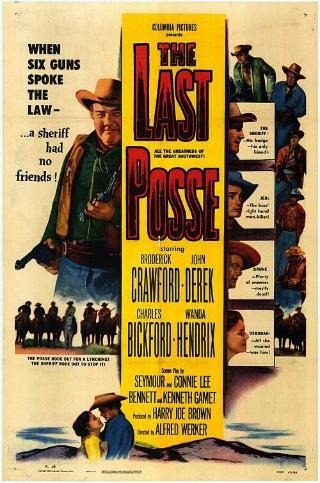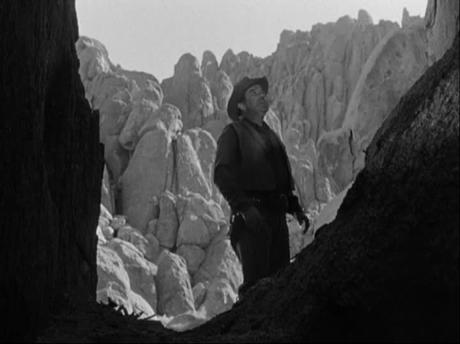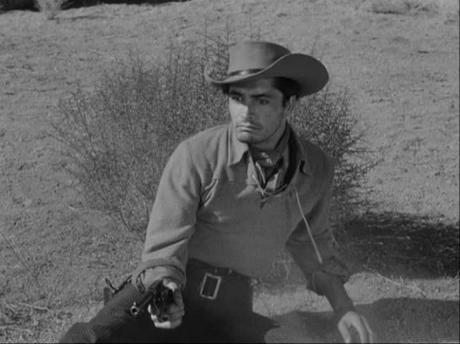
Small films with big themes, that’s perhaps as good a summation of the successful B movie as any. Low budget films were always capable of using a superficially simple tale to disguise layers of depth and complexity, the smarter and more skillful efforts using standard cinematic techniques to do so. The Last Posse (1953) is all about the past, both the recent and distant forms, and how the events which occurred drive the actions of men in the present, and indeed have shaped how they and others view themselves.
A posse is usually a group of residents sworn in as temporary deputies, charged with upholding the law via the pursuit of criminals. The film opens with one such group, tired, dusty and disheveled, making their way home to a small New Mexico town. Among them is one man who is clearly in considerably worse shape than his fellow riders. John Frazier (Broderick Crawford) is the town sheriff, a man of once mighty reputation who is now gut-shot and dying. The drawn faces of the men, the mortally wounded lawman, and the tension writ large on the countenances of the townsfolk leave no doubt that something went badly wrong out there in the desolation of the desert. As the remainder of the posse head off to clean up we can see by their furtive manner and whispered conversation that all may not be the way they’re telling it. Their story has it that the fugitives died after a shootout which also claimed the leader of the posse and, most tellingly, that the $105,000 of stolen money was nowhere to be found. While these leading citizens reappear freshly scrubbed and suitably spruced up there’s no hiding the fact that there are other stains, those on the conscience, which can be neither washed away nor wished away. So what did happen out there in the wilderness? It seems wholly appropriate that a film which concerns itself so much with the past should be told and find its ultimate resolution by means of three lengthy flashback sequences seen from three separate perspectives.

The Last Posse was directed by Alfred Werker, and it was the strong endorsement of both the filmmaker and this title by regular contributor John Knight which led me to view it. I was already with a number of Werker’s other movies (The Adventures of Sherlock Holmes, He Walked by Night, Shock, Three Hours to Kill and At Gunpoint to name just a few) and I’m keen to see more, Repeat Performance in particular. He was a director capable of packing a good deal of atmosphere and tension into what were, for the most part, small productions. Here we get another fine piece of work, an hour and a quarter of sustained suspense delivered at a smart pace from a smooth script by Seymour Bennett, Connie Lee Bennett and Kenneth Gamet. In the best tradition of western filmmaking, the layers of hypocrisy and faux civilization are gradually stripped away to allow the truth to be revealed as the action moves away from the town, out into the desert and the rocks of Lone Pine. It’s here in this harsh and sparse landscape (beautifully shot by Burnett Guffey) that the illusions and cant are burned away by the merciless sun, and the deceit of the past collides with the brutal reality of the present.
Broderick Crawford is one of those actors I can take or leave, often depending on the kind of role he’s playing. He could have a loud, almost mechanical quality leading to some one-note performances. However, there was also something bruised and lived-in about him, I suppose you could call it the weariness of his years. Whenever he tapped into that, as he certainly does in The Last Posse, he had a lot more to offer. It could be argued that a few characters in the film are somewhat underwritten, more on that shortly, but Crawford doesn’t suffer in that respect. Frazier is a man who has been almost broken by life, propping himself up mainly with alcohol, and with little regard for the quality of men he now has to associate with. What comes across most powerfully is a sense of guilt and regret for a life badly lived, and a good deal of that seems connected to the relationship with Charles Bickford’s Sampson Drune character. The exact nature of the men’s hostility and enmity becomes slowly apparent the deeper they move into the desert but it also highlights one of the weaknesses in the script. Bickford always shone in villainous parts, those craggy features and penetrating eyes were ideal, and he’s suitably arrogant and cruel as Drune. The problem, as I see it though, is that the writing of his character allows for little else; it’s heavily alluded to that he’s also driven by fear and a kind of warped paternal instinct, but the script permits little if any of that to be actively shown. As a result, the vital backstory – the actual core of the movie – is of course ever-present yet lacks a little due to the presentation of the character.

John Derek is one of those actors whose contribution to the movies tends to be underrated or glossed over. I think I first saw him in his breakout role in Nicholas Ray’s Knock on Any Door and I’m of the opinion he was a perfectly competent performer. He recently came to my attention again during the Republic blogathon when The Outcast was featured, a film I’ve since acquired for future viewing. Derek’s role in The Last Posse is an important within the context of the picture but he’s overshadowed for much of the running time by both Crawford and Bickford. Much of the cast is made up of familiar character players: notably Henry Hull, Warner Anderson, Will Wright and, as one of the trio of fugitives, Skip Homeier. This is very much a film dominated by the men and the only female role of note goes to Wanda Hendrix, although it’s really a nothing part – I was actually more intrigued by the uncredited Hispanic girl, the one with her eye on Anderson’s blowhard editor, as her two brief appearances hinted at an altogether more fascinating relationship.
The Last Posse is available as a MOD disc from Sony in the US, it was a Columbia production, and looks good. The film has been given a nice clean transfer and the crisp black and white photography is very attractive. Overall, this is a solid, pacy little western with plenty of depth, even if all aspects of that aren’t explored as fully as they might have been. Definitely worth checking out if the opportunity arises.
